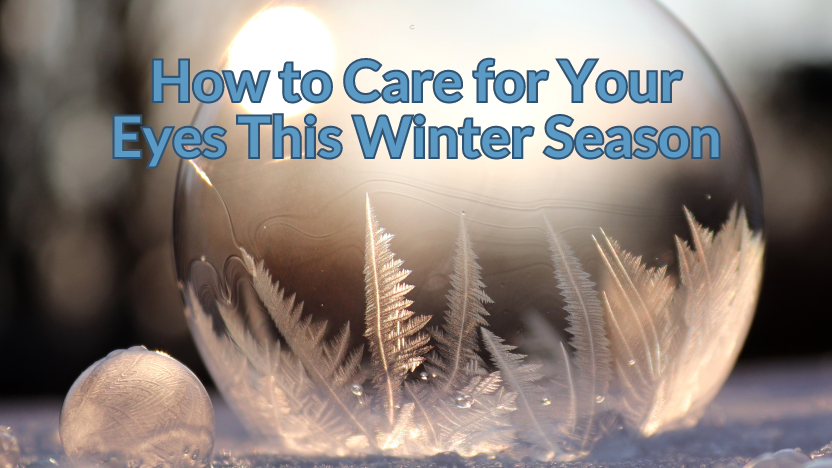Taking Care of Your Eyes This Winter
Posted by EyePromise on Dec 14th 2023
Seasonal changes can trigger many different symptoms, including sneezing, coughing, congestion, headache, and more. Even the eyes can experience seasonal symptoms like dryness, itching, redness, and excessive watering, and unfortunately, not all symptoms disappear when the seasons change. Experts shared their suggestions for taking care of your eye health specifically during winter weather, and we’ve grouped them into categories for your consideration.
Indoor Environments

Indoor environments during the winter can exacerbate seasonal eye symptoms like dryness, burning, excessive watering, and more due to the dry, warm air created with heaters and furnaces. Experts recommend:
- Choose a mild temperature, as higher temperatures escalate the dry, hot air.
- Consciously blink…a lot. Blinking slows down when we engage in any activity requiring dedicated visual attention like doing puzzles, reading, or using the computer. By consciously blinking more, you’re helping your eyes stay lubricated.
- Implement the 20:20:20 rule for digital screen use. Look at something at least 20 feet away for 20 seconds every 20 minutes. Blink often during this pause to help reset your eyes’ lubrication and focus.
- Invest in a humidifier. Heating systems can reduce the natural moisture of indoor air and compromise the quality. A humidifier introduces much-needed moisture back into the air without impeding the heating system.
- Try to stay away from direct heat sources. As tempting as it can be to hover over a radiator, heater, or fire during these cold days, these heat sources are direct lines to dry air, which can worsen ocular symptoms. Keeping a safe distance helps to ensure optimal eye comfort.
- Investigate eye drops. If your eyes continue to bother you after implementing all these changes, eye drops can be a good but temporary solution. If you find yourself using drops multiple times a day, it may be time to find a more permanent solution.
Outdoor Environments

While the environment indoors is within our control (for the most part), the outdoors introduces additional issues that can be more difficult to manage. However, experts have shared the following recommendations for you to implement for optimal eye health.
- Invest in quality sunglasses. While sunglasses are often considered a “summer accessory,” bright sunlight and UV rays are still issues to deal with during the winter months, even on cloudy days. Additionally, snow can reflect UV rays, making them even more dangerous and making it even more important to invest in quality sunglasses.
- Make sure you have the right protective equipment (and are wearing it). Many people love winter for its extracurricular activities like skiing, snowboarding, sledding, tubing, ice skating, and more. Wearing goggles helps protect your eyes from flying snow and extreme winds. You can purchase goggles that have built-in UV protection, too, checking off 2 items on this list!
- Prepare your car (and eyes) for driving in winter. Night driving poses many issues, and long winter nights add other challenges, including wet, slippery roads and glare from oncoming vehicles. Check your headlights and windshield to ensure they are clean and functioning well. Get 3 additional tips for preparing to drive at night.
Hygiene

Hygiene is one of the most important factors when it comes to year-round eye comfort. Following these expert recommendations can help you find lasting relief from seasonal ocular symptoms.
- Schedule annual eye exams. Scheduling and maintaining your annual eye exams can help you identify any extenuating ocular issues that may be contributing to your symptoms. Additionally, they can help you ensure your prescription is up to date so you’re seeing your sharpest always.
- Keep your eyes clean. This may sound like a no-brainer, but with the hustle and bustle of the holiday, it can be easy to let hygiene slip. Wash your face thoroughly every evening, ensuring that you’ve removed any makeup residues, sweat, and germs. Avoid sharing makeup, brushes, eye drops, etc., as this may transfer a viral or bacterial eye infection.
- Avoid touching your eyes. You may get the urge to rub your eyes if they’re feeling all those seasonal symptoms like dryness and irritation. However, this action can do more harm than good, as it only provides temporary relief and can introduce germs to the eye.
- If your eyes start bothering you, act immediately. One of the simplest, most effective ways to provide relief is by placing a clean, warm, damp cloth over the eyes for 15 minutes.
Diet

Yes, we know you’re probably tired of seeing this type of suggestion. The truth is that what we put into our bodies has an immense impact on what we can get out of our bodies. To help ward off some of the common ocular symptoms in the winter, experts recommend:
- Eat more cold-water fish. Cold water fish like tuna, mackerel, and halibut are packed with Omega-3 essential fatty acids, which can help the eyes maintain lubrication during the dry winter months. Learn more about nutrition and occasional dry eye.
- Stay hydrated. Making sure you’re appropriately hydrated helps to ensure that your eyes are getting enough moisture to maintain comfort. Get tips for drinking more water throughout the day.
Finding lasting relief from seasonal ocular symptoms throughout the winter doesn’t have to be a never-ending battle. Implement the expert recommendations above to see if you can find comfort this holiday season.

